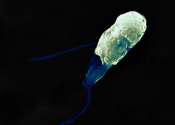Single gene causes stinging cell to lose its sting
When scientists disabled a single regulatory gene in a species of sea anemone, a stinging cell that shoots a venomous miniature harpoon for hunting and self-defense shifted to shoot a sticky thread that entangles prey instead, ...







